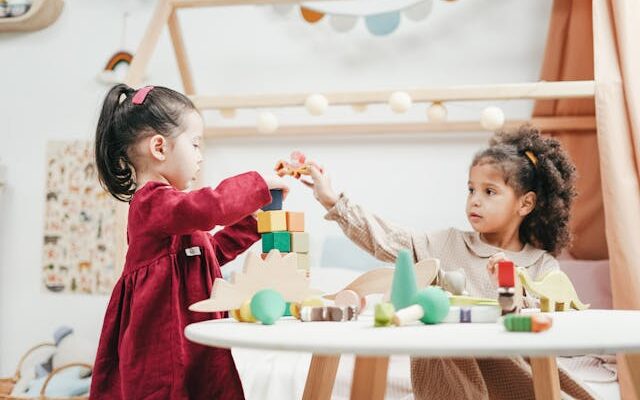
The formative years of a child are the most important for their entire growth. A quality preschool helps a kid develop holistically by using play to help them acquire a variety of abilities. Preschools do not have a curriculum-in-a-box, but they do need to teach kids certain skills and abilities through various engaging and imaginative methods. Preschool is a crucial period for a child’s development in many domains, including social, physical, cognitive, language, and ability to adapt.
“Pre-skills” are taught to preschoolers, laying the foundation for later life. Preschoolers develop skills via playing, singing, and learning that will eventually help them become outstanding learners by teaching them to read, write, and improve their maths and science abilities. Additionally, preschoolers acquire “school readiness” skills that aid in their understanding of school procedures, group collaboration, and student behaviour. The following are the top ten things preschoolers typically learn:
Motor Skills
Children in preschool acquire the ability to use both their fine motor skills such as hand dexterity and hand-eye coordination and gross motor skills which include big muscular motions. Preschools in Thrissur often dedicate a significant amount of time to practising these developmental skills. Fine motor exercises include cutting, colouring, glueing, and sketching. These skills are necessary for writing, gripping, and coordinating small movements. Gross motor skills are frequently practised through activities including running, skipping, jumping, kicking, and tossing a ball to a partner.
Social Skills
By playing together and learning alongside one another, preschoolers learn how to appreciate and get along with others, which helps them further develop their language skills, self-control, and general social skills. The number of students and instructors at a preschool is the first thing a child sees. The purpose of preschool activities is to establish in kids the habit of having conversations with each other. Teachers also emphasise getting students to collaborate and play with one another. Each of these elements lays the groundwork for the child’s social skill development. They begin to realise that having other people in their lives makes life easier, and this realisation is the key to their future success. Other skills that are acquired through preschool activities include sharing, cooperating, and resolving problems.
Listening Skills
A child’s ability to listen is crucial to their overall social and intellectual development since it will allow them to understand what is being taught to them and follow directions. Preschool environments support activities that develop a child’s listening abilities. Through activities like listening to stories, obeying directions, participating in class discussions, and engaging in musical activities, children can develop their listening skills.
Emotional Ability
Every human being believes that they are the centre of the universe if left to their own devices. While there are many ways in which the “real world” teaches us differently, preschools can be incredibly secure and supportive environments for children to develop empathy and understanding. Children learn about many viewpoints and feelings through their interactions with classmates, which fosters the development of empathy and compassion. Preschools that prioritise social and emotional learning prepare their young kids for great success in the real world, according to research.
Early Maths Skills
Preschoolers who are beginning to recognise numbers and count objects lay the groundwork for the increasingly complex mathematics curricula of each subsequent year. This aids children in starting to comprehend the practical applications of mathematics. They gain the capacity to understand dimensions, measurements, and patterns, as well as to count and recognise numbers and differentiate between shapes. Their foundation for basic maths concepts is laid in preschool.
Core Science Skills
Preschool education includes a strong science component. Children are encouraged to participate in and are taught weather mapping, gardening, and observation. Additionally, preschoolers comprehend several scientific fields of study to better investigate the natural environment. Information on tigers, birds, plants, elephants, and other creatures is provided by exploring the animal and plant kingdoms through visual and multimedia formats. Young children have an innate understanding of the value of science and develop a deep appreciation for the natural world and science.
Pre-Reading Skills
Early literacy skills, which encompass all the pre-reading abilities required to prepare children for formal reading instruction, are developed in preschool. Building both symbol and sound knowledge, auditory and visual perception, is necessary for learning to read. Children can develop their pre-reading skills by playing games that involve rhymes, word games, syllable recognition, listening games, and obeying directions.
Pre-Writing Skills
Prior to writing, children must acquire critical prewriting skills through play and creative endeavours. The emphasis in preschool will be on these four particular skills, which are prerequisites for learning to write:
- Pencil grip
- Passing through the midpoint
- Acquiring knowledge of the structure of letters via play
- Acquiring the ability to create patterns (for instance, sketching large waves or zig zags that resemble letter shapes).
Communication Skills
A child’s ability to express their needs and desires through spoken language, body language, questions, and inquiries is crucial to their social and scholastic success. With the help of activities and teacher feedback, preschoolers learn all of these communication abilities.
Language And Vocabulary
Preschoolers gain more vocabulary as they begin to build sentences, pronounce a variety of words, and understand the meaning of several phrases. A child’s vocabulary and language skills will expand every day. Rhyming games, playing with classmates, performing group talks, and listening to stories are all used to teach this.
Conclusion
Preschool experiences and teachings lay the foundation for children’s future growth and achievement, from developing life skills to grasping basic academic concepts. It is imperative that parents ensure their children have access to top-notch preschool education.
Read to know:
Elevating Education Standards: The Vision of Our CBSC School
Tips for managing work-life balance while pursuing further education?










